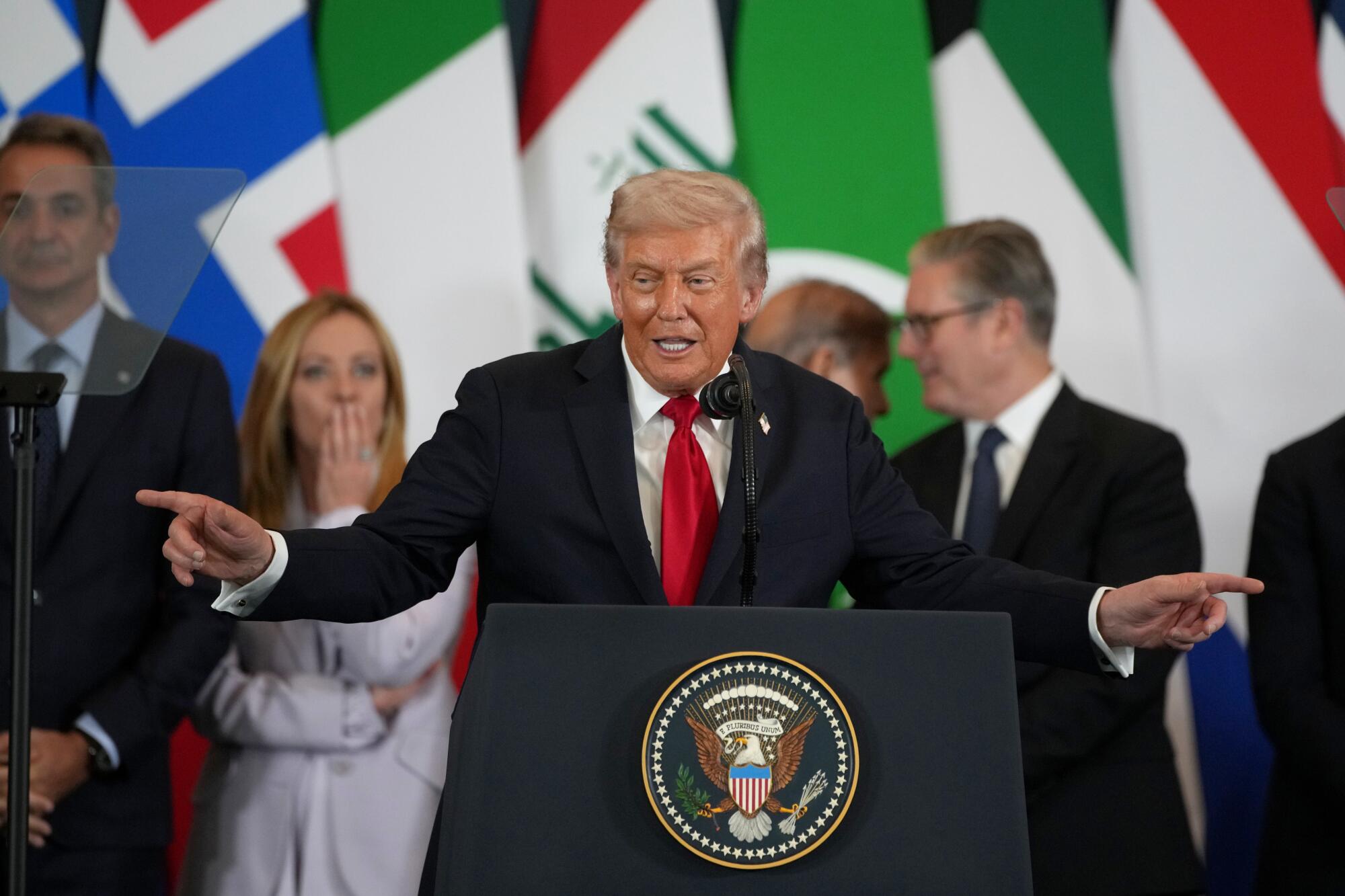Summoned last minute by the president of the United States, the world’s most powerful leaders dropped their schedules to fly to Egypt on Monday, where they idled on a stage awaiting Donald Trump’s grand entrance.
They were there to celebrate a significant U.S. diplomatic achievement that has ended hostilities in Gaza after two brutal years of war. But really, they were there for Trump, who took a victory lap for brokering what he called the “greatest deal of them all.”
“Together we’ve achieved what everyone said was impossible, but at long last, we have peace in the Middle East,” Trump told gathered presidents, sheikhs, prime ministers and emirs, arriving in Egypt after addressing the Knesset in Israel. “Nobody thought it could ever get there, and now we’re there.”
“Now, the rebuilding begins — the rebuilding is maybe going to be the easiest part,” Trump said. “I think we’ve done a lot of the hardest part, because the rest comes together. We all know how to rebuild, and we know how to build better than anybody in the world.”
The achievement of a ceasefire in Gaza has earned Trump praise from across the political aisle and from U.S. friends and foes around the world, securing an elusive peace that officials hope will endure long enough to provide space for a wider settlement of Mideast tensions.
Trump’s negotiation of the Abraham Accords in his first term, which saw his administration secure diplomatic relations between Israel and the United Arab Emirates, Bahrain, Sudan and Morocco, were a nonpartisan success embraced by the succeeding Biden administration. But it was the Oct. 7 attack on Israel, and the overwhelming response from Israel that followed, that interrupted efforts by President Biden and his team to build on their success.
The Trump administration now hopes to get talks of expanding the Abraham Accords back on track, eyeing new deals between Israel and Lebanon, Syria, and most of all, Saudi Arabia, effectively ending Israel’s isolation from the Arab world.
Yet, while the current Gaza war appears to be over, the greater Israeli-Palestinian conflict remains.
Trump’s diplomatic success halted the deadliest and most destructive war between Israelis and Palestinians in history, making the achievement all the more notable. Yet the record of the conflict shows a pattern of cyclical violence that flares when similar ceasefires are followed by periods of global neglect.
The first phase of Trump’s peace plan saw Israeli defense forces withdraw from half of Gazan territory, followed by the release of the remaining hostages held by Hamas since Oct. 7 in exchange for nearly 2,000 Palestinian prisoners in Israeli custody.
The next phase — Hamas’ disarmament and Gaza’s reconstruction — may not in fact be “the easiest part,” experts say.
“Phase two depends on Trump keeping everyone’s feet to the fire,” said Dennis Ross, a veteran diplomat on the Israeli-Palestinian conflict who served in the George H.W. Bush, Clinton and Obama administrations.
“Israeli withdrawal and reconstruction are tied together,” he added. “The Saudis and Emiratis won’t invest the big sums Trump talked about without it. Otherwise they know this will happen again.”
While the Israeli government voted to approve the conditions of the hostage release, neither side has agreed to later stages of Trump’s plan, which would see Hamas militants granted amnesty for disarming and vowing to remain outside of Palestinian governance going forward.
An apolitical, technocratic council would assume governing responsibilities for an interim period, with an international body, chaired by Trump, overseeing reconstruction of a territory that has seen 90% of its structures destroyed.
President Trump speaks during a summit of world leaders Monday in Sharm El Sheikh, Egypt.
(Amr Nabil / Associated Press)
The document, in other words, is not just a concession of defeat by Hamas, but a full and complete surrender that few in the Middle East believe the group will ultimately accept. While Hamas could technically cease to exist, the Muslim Brotherhood — a sprawling political movement throughout the region from which Hamas was born — could end up reviving the group in another form.
In Israel, the success of the next stage — as well as a long-delayed internal investigation into the government failures that led to Oct. 7 — will likely dominate the next election, which could be called for any time next year.
Netanyahu’s domestic polling fluctuated dramatically over the course of the war, and both flanks of Israeli society, from the moderate left to the far right, are expected to exploit the country’s growing war fatigue under his leadership for their own political gain.
Netanyahu’s instinct has been to run to the right in every Israeli election this past decade. But catering to a voting bloc fueling Israel’s settler enterprise in the West Bank — long the more peaceful Palestinian territory, governed by an historically weak Palestinian Authority — runs the risk of spawning another crisis that could quickly upend Trump’s peace effort.
And crises in the West Bank have prompted the resumption of war in Gaza before.
“Israelis will fear Hamas would dominate a Palestinian state, and that is why disarmament of Hamas and reform of the PA are so important. Having Saudi leaders reach out to Israeli public would help,” Ross said.
“The creeping annexation in the West Bank must stop,” Ross added. “The expansion of settlements must stop, and the violence of extremist settlers must stop.”
In the immediate aftermath of Oct. 7, Netanyahu faced broad criticism for a yearslong strategy of disempowering the Palestinian Authority to Hamas’ benefit, preferring a conflict he knew Israel could win over a peace Israel could not control.
So the true fate of Trump’s peace plan may ultimately come down to the type of peace Netanyahu chooses to pursue in the heat of an election year.
“You are committed to this peace,” Netanyahu said Monday, standing alongside Trump in the Knesset. The Israeli prime minister added: “I am committed to this peace.”
